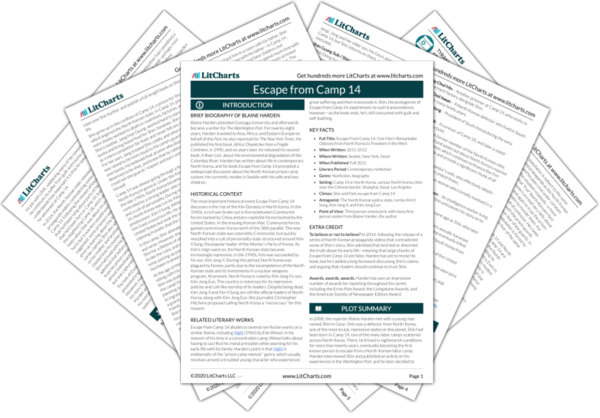Summary
Analysis
At the Camp 14 garment factory, Shin is responsible for repairing sewing machines—a tough job, since the machines break down constantly. Often, the repairmen take out their anger on the female garment workers, slapping and kicking them. Shin is encouraged to be brutal with the women in the factory. One day, he sees a coworker named Gong Jin Soo hitting a woman, and Shin retaliates by hitting Gong in the head with a wrench. Shin’s foreman slaps Shin but didn't punish him any further. From then on, Gong keeps away from Shin.
This passage represents one of the only times in the book when Shin risks his own life to stand up for someone else. Harden offers no explanation for why, out of the blue, Shin began standing up for other prisoners (when previously he joined the guards in beating others). Perhaps this is one time when Shin distorts the truth to alleviate some of his own guilt—but in any event, Harden (and, presumably, Shin) is so vague that it’s difficult to understand what was really going on here.
Themes
During his time in the garment factory, Shin works alongside hundreds of woman. This creates sexual tension in the factory—especially because Shin is still a virgin (like most of his peers). Sometimes, Shin’s superiors force female underlings to have sex with them—they have no choice but to comply. One especially beautiful seamstress named Park Choon Young is often called into the superintendent’s office for sexual favors. Then it becomes obvious that she’s pregnant, at which point “she disappeared.”
Attractive women had some of the most miserable lives of anyone living in the prison camp: they were punished for their beauty with constant harassment and sexual advances from the all-powerful guards, and when, inevitably, one of the guards impregnated them, they were (presumably) murdered rather than allowed to bear children.
Themes
In 2004, Shin accidentally breaks a heavy sewing machine it. His foreman, who’s been very patient with him in the past, slaps him and reports the damage. Shin is then called in to the superintendent’s office, and the chief foreman hacks off his middle finger with a knife. Shin isn’t given much medical treatment, but, remembering how Uncle treated his wounds with salty cabbage, he dips his wound in soup, and succeeds in preventing an infection from spreading. The foreman, a patient man, fills in for Shin for two days after his injury, but he disappears soon after. Before disappearing, the foreman gives Shin some rice flour, saying it’s from Shin’s father. Shin refuses to eat it.
Shin has since denied most of the information in this passage; he lost his finger after being tortured in prison, and he wasn’t estranged from his father—in fact, he lived with his father during most of his teen years. As the passage presents the evidence, however, Shin was clearly angry with his father, and blamed him for his mother’s death in some way. Perhaps Shin lied about living with his father to make himself seem angrier about his mother’s death than he really was.
Themes
Snitching is very common in the factory. A coworker snitches on Shin for sneaking food from the vegetable garden outside. The next day, Shin is called into the superintendent’s office, and the superintendent hits him with a stick. Afterwards, however, Shin is asked to spy on his coworkers. Two months later, Shin learns of a worker named Kang Chul Min, who has stolen cloth from the factory in order to repair his pants. Shin reports Kang, and Kang is later beaten for ninety minutes. Shin and the other factory workers are ordered to slap Kang in the face—Shin does so without hesitation.
Shin was both a valued snitch (since he’d sold out his family) and the victim of other snitches—as a result, Shin seemed to accept and expect that his peers would inform on him for their own selfish benefit, and that he’d just as soon do the same for them. He continued to participate in cruelty and violence at the camp, partly because he’d been trained to do so since he was a child (and again making it confusing why he suddenly stood up for a peer earlier in this same chapter).
Themes
Get the entire Escape from Camp 14 LitChart as a printable PDF.













